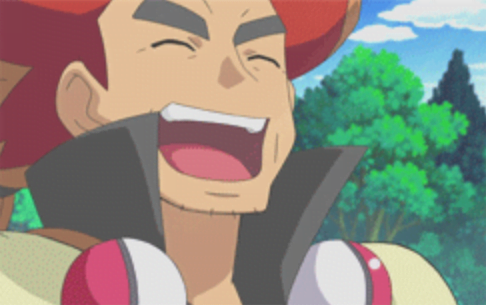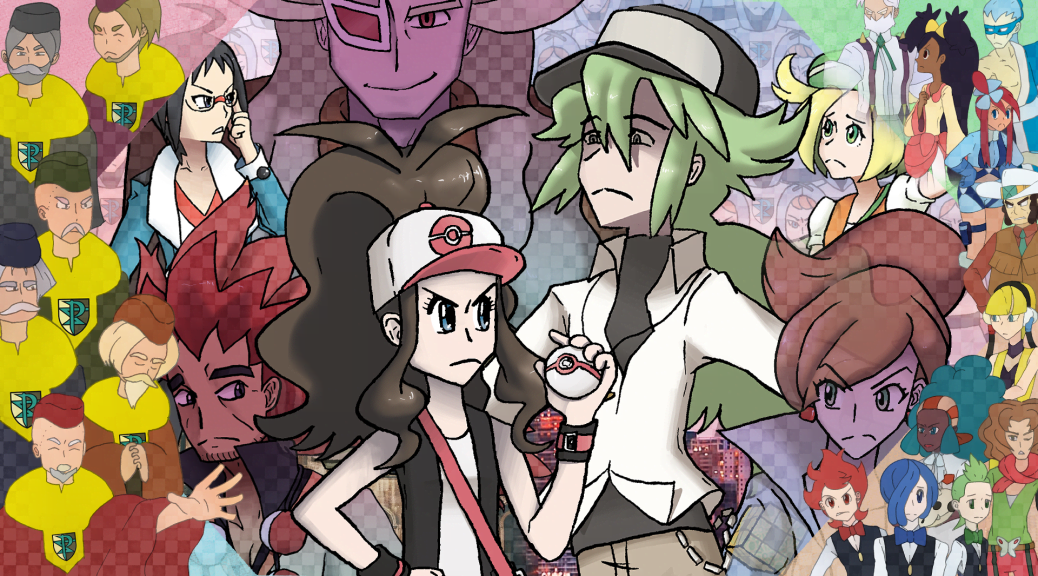Part III: The Cast of Unova
Part III of our tribute to Pokémon Black and White focuses on each of the games’ many characters.
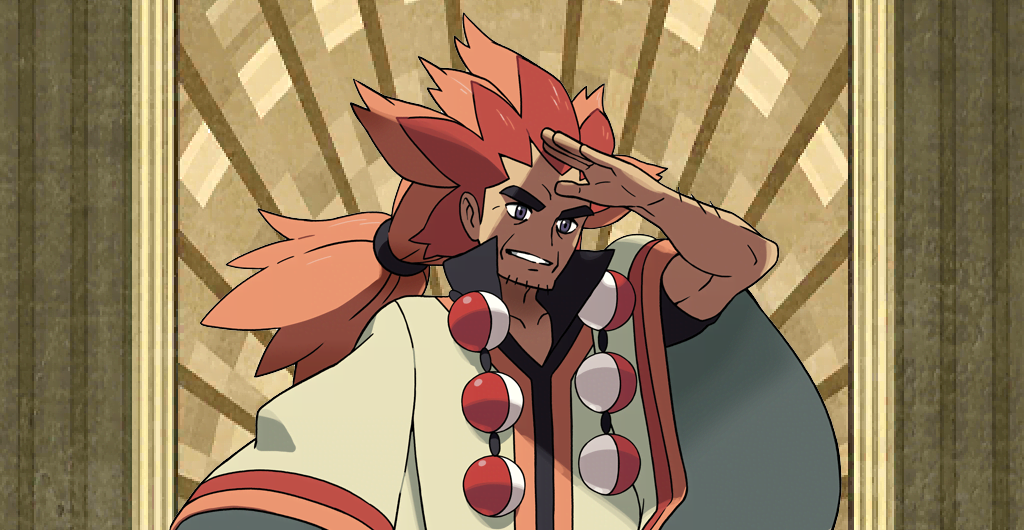
Part III: The Cast of Unova
Hilda and Hilbert | Juniper | Bianca | Cheren | The Gym Leaders | The Elite Four | Alder
Team Plasma Grunts | Concordia and Anthea | The Seven Sages | The Shadow Triad | Ghetsis | N
Alder
Each Pokémon game comes complete with its own Champion. Even in the games set in Kanto and Alola, where the Champion is only decided at the very end of the game, a Champion is crowned nonetheless.
Although earning and maintaining the title of Champion seems fairly straightforward—defeat the current Champion to become Champion yourself—the responsibilities that come with said title aren’t nearly as well-established. Champions such as Lance, Steven, and Cynthia only do the bare minimum against the threats building against their respective regions, leaving the brunt of the work, as well as the final showdown with the main villain, to the player. Lance has his Dragonite commit violence on a Team Rocket grunt, and in HeartGold and SoulSilver he teams up with the player to battle Ariana, but not the bigger baddie, Archer. Cynthia asks Cyrus a few questions in Platinum‘s Distortion World, but never once battles him. Steven puts in work engaging in a multi battle with you against Maxie and Tabitha in Emerald, but not only is this fight absent in the games in which he’s actually Champion, but he also leaves Archie for you to deal with alone. Other Champions, such as Diantha, take absolutely no stand against their games’ respective villains at all, despite having direct run-ins with the villainous teams in one way or another!
But that always leaves players wondering: why does the Champion not do more to help against the threat of the evil teams? Part of this is an unavoidable side effect of the video game medium—it would be an incredible letdown for players to not be the one in charge of taking down the big bad boss. This is evidenced by Galar’s Champion Leon, who leans too far in the other direction: by single-handedly resolving all of the region’s vague inconveniences off-screen, all meaningful conflict gets delegated to the games’ final half hour. Although the right balance between when to step in and when to stand back is a challenge to reach, it’s necessary all the same, as the inability to accommodate for both gameplay and story needs still leads to the regional Champions’ awkward characterization.
Another thing that leads to awkward characterization is how their identity is kept secret until the end of the game. While this allows the final battle to be a bit of a surprise, this rarely works out in the games’ favor. Although characters like Steven and Cynthia appear around their respective regions, no one addresses them or regards them as if they’re Champions. It also means, in the cases where the Champion is hardly relevant at all, such as with Diantha, the final battle is incredibly anticlimactic, as you face off against a character you have absolutely no connection with. The Champion battle becomes an obligation rather than a meaningful showdown.
In practice, each Champion battle is more of an obligation than anything. Although the world of Pokémon insists that the Champion is the strongest Trainer, and the title you should naturally aspire to, the primary conflict the player is forcibly thrust into each and every game is inherently more pressing and impressive to resolve. No matter how much other games hype up the final showdown with the—supposedly—stronger-than-all Champion, catching a region-devouring hand that the unbeatable Champion couldn’t is more important than the Champion catching your hands. Saving the world from being flooded or burned to a crisp will always be a greater feat than defeating a rock collector. Saving the universe from being unraveled at the seams will always be more notable than defeating a junior historian. And stopping a plot of mass genocide will always be more meaningful than defeating an actress.
But this narratively undermines how the Pokémon series wants to portray the Champion. With the exception of Sword and Shield, that lacks major conflict almost entirely due to the aforementioned Champion’s over-involvement, the conflict with the games’ evil teams is always resolved before the player challenges the final Gym Leader. This leads to an awkwardly long denouement that’s still meant to lead to a battle just as climactic as the evil team’s boss. It’s an established truth of the Pokémon series that the Champion is the strongest Trainer there is, and to a minor extent they are. Although Trainers with higher-leveled Pokémon lurk in the post-game, the Champion’s team boasts the highest levels of the main campaign, making them the strongest by technicality.
But what good is being “strong” if you don’t use that strength for anything more than defending your title? In each Pokémon game, the player always proves they’re the “strongest,” and long before obtaining the title of Champion, due to their involvement in shutting down the region’s evil organization. The player’s “strength” never, ever comes from defeating the Champion.
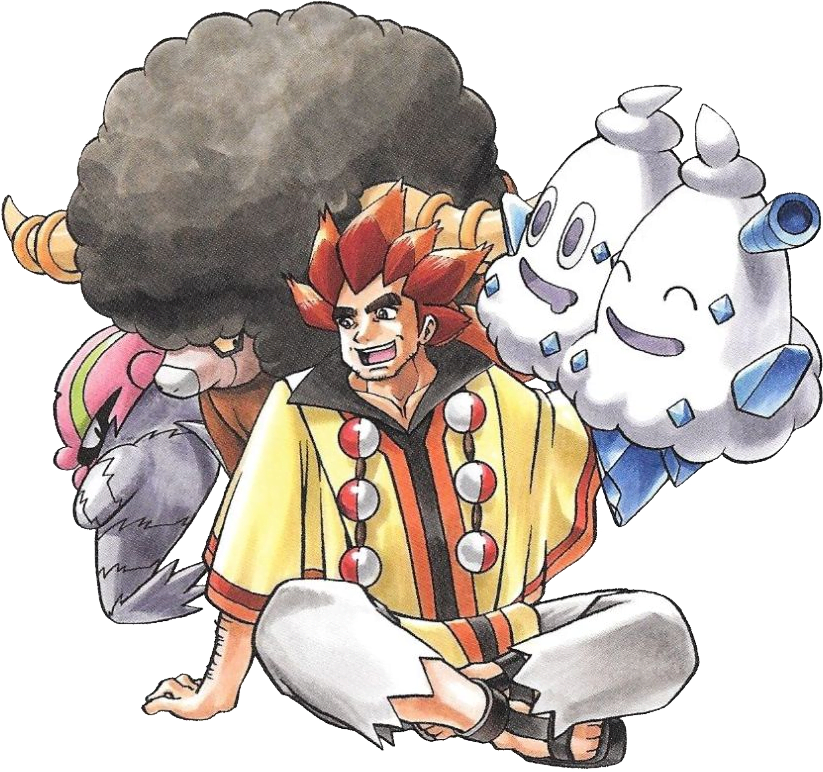
The Champion of Unova, Alder, is introduced to players on Route 5, after earning the Bolt Badge. Because N’s goal involves defeating the Champion, there’s a benefit to revealing the Champion’s identity before the final confrontation with him—that being Alder’s highly nuanced role intertwining with the overarching story of Black and White.
Along with Alder comes Cheren’s declaration that the Champion is the strongest Trainer, no ifs, ands, or buts. And yet you first meet Alder enjoying a street festival and appearing to neglect his duties as Champion. This prompts Alder to make Cheren question his goals. The player never has to question why they want to become the Champion because it’s a requirement to win the game. Alder instead focuses his attention on Cheren, using the opportunity to serve as a mentor and father figure to him while also emphasizing how Black and White turn typical Pokémon tropes on their heads. Other Pokémon games encourage the player to “become strong,” but Black and White have you question what “strength” really is—what are you strong at, and what is that strength good for?
At the start, Alder insists he uses his strength to help “people learn to love Pokémon.” This is evidenced by the children he asks you to “play”—battle—with on Route 5. After defeating them, they explain to you that they were once afraid of Pokémon, and it was Alder who helped them overcome their fears. Alder also maintains that he isn’t “goofing off,” but rather, “on a voyage.” “I know every corner of Unova,” he says, and you learn to believe it. Later in the game, when you’ve yet to travel much further than Icirrus City, Alder can Fly—animation and all—from Nacrene City to Opelucid. Alder really has seen the entire region of Unova, and he has helped all sorts of people along the way.
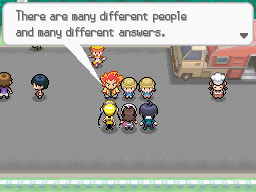 Alder even has trade evolution Pokémon, Escavalier and Accelgor, on his team when you can finally battle him in the post-game, adding further credence to his claims of spending his time working and connecting with others. Although he isn’t attending to his basic duties as Champion when you first meet him, Alder isn’t exaggerating when he says that he has “helped many people learn to love Pokémon.” If this is what Alder considers to be “strength,” can anyone really argue otherwise?
Alder even has trade evolution Pokémon, Escavalier and Accelgor, on his team when you can finally battle him in the post-game, adding further credence to his claims of spending his time working and connecting with others. Although he isn’t attending to his basic duties as Champion when you first meet him, Alder isn’t exaggerating when he says that he has “helped many people learn to love Pokémon.” If this is what Alder considers to be “strength,” can anyone really argue otherwise?
Unfortunately, the arguments do in fact start coming later in the story. The Gym Leaders of Unova exhibit the responsibility to help people with their troubles, which is why they’re so frequently involved with your trials against Team Plasma. This responsibility naturally moves upward to the Champion. But in a world where conflicts are resolved through Pokémon battles, can a Champion who has almost entirely ceased battling live up to his responsibility to protect the region in its darkest hour?
The answer is, unsurprisingly, no. Not only does N have his sights set on the championship, forcing Alder into a position where he must battle him, but N’s goals are in direct opposition to Alder’s own. Whereas N wants to separate people and Pokémon, Alder has spent his time away from the league helping people and Pokémon grow closer to one another. But Alder’s lack of practice catches up to him, and before long it is deemed Alder will, without a doubt, fall to N.
Deep within the Relic Castle, Ghetsis confirms as much when meeting with Alder, you, and Cheren. Although Alder maintains a firm resolve, exclaiming, “I won’t lose! I’ll fight for all Trainers who love their Pokémon, and for all Pokémon who believe in their Trainers!” Ghetsis shuts him down immediately. “Our king has no interest in you. He has already determined that victory against you is assured,” he says cruelly.
Here in Relic Castle is also where we learn why Alder has made the choices he has. When Alder stands firm against Ghetsis’s attempts at manipulation, Ghetsis responds with a low blow: “What’s this? Champion Alder, even though illness took the Pokémon that had been your partner for many years, and you haven’t had a serious battle in all that time… Even you, who ordered the Elite Four to protect the Pokémon League and left to wander the Unova region alone… Even a Champion like you now wants to protect a world where Pokémon and people live together?”
The fact that Alder has lost a Pokémon near and dear to him reflects in his dialogue and actions, even before this reveal. Upon first meeting him, he remarks that “Life should be enjoyed!” To Alder, taking the time to just relax and enjoy life is invaluable, because he’s experienced firsthand how life doesn’t last forever. When he insists to the children on Route 5 or to Cheren outside Twist Mountain that they had a “good battle” despite their loss, it’s from a place of love for simply spending time with Pokémon—time that will inevitably have to come to an end for everyone.
For Alder, it is unacceptable to cut the time people and Pokémon have to be together shorter than it already is. He took up his leisurely lifestyle to enjoy life to its fullest and to help others do the same before it meets its end. But it led to a complacency that will cost the region its connection between people and Pokémon—the connection he’s worked so hard to strengthen over the many years since his Pokémon’s death.
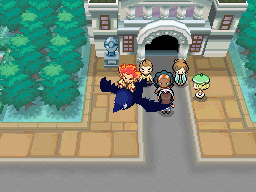
You will not take this sitting down, however. Through collaboration with the Gym Leaders and professors, you all discover that the stone resting in the Nacrene Museum is the key to resurrecting the legendary dragon that can put a stop to N’s plans.
“If you take [that stone],” Alder says solemnly to you, “that means you’ll be the one to battle N if anything happens to me. Are you really OK with that?” After agreeing, he responds with, “I am deeply sorry. I wish I didn’t have to burden you.” Alder is clearly not comfortable putting this pressure on the player—he is the Champion, after all. He should be able to stop Team Plasma on his own. He shouldn’t have to rely on, or put undue stress upon, a child who only just recently began their own Pokémon journey the way Champions of the past have so easily done. And yet he realizes, deep down, that entrusting this responsibility onto you is necessary.
If for some reason you say no to accepting the stone, Alder implores you to take it, “just in case it’s needed.” Lenora confirms that you’ll only use the stone “If things don’t go as planned,” holding onto hope that Alder can defeat N at the Pokémon League. She trusts the Champion despite the impending tragic outcome.
The “weaknesses” Alder is given throughout Black and White give him a reason to lose to N, allowing the player to save the day all while ensuring the region’s Champion is still involved in the games’ primary conflict to just the right degree. “This world of ours, where Pokémon and people live together… Please…” he pleads, “If anything happens to me, protect it!” Heartbreakingly, you all know it’s not a matter of “if,” but “when.”
From here, however, you need to figure out how to actually awaken the dragon within the stone, which takes you to Opelucid City. The mayor, Drayden, is not so pleased to see Alder there. “What’s wrong? What does the wandering Champion who left the Pokémon League need from us?” he asks bitterly, clearly not approving of Alder’s decision to leave the League in the hands of the Elite Four while he went on his “voyage.” Although the entire cast of Unova is connected, with the Gym Leaders, professors, and Champion all knowing each other, they still all have their own perspectives and opinions of each other.
Iris, young and naive as she is, is genuinely worried for Alder as he makes his return to the league. Drayden reassures her, insisting that “He is the strongest Trainer in all of Unova.” This calms her because the status quo is comforting. Because we’re used to it, it’s a cave that’s safe and easy to return to, and therefore an effective way to put a young child who is anxious about change at ease. The Champion being the “strongest” isn’t only part of the Pokémon series status quo, but is also a part of Black and White’s effective implementation of the power of rhetoric. In this case, it’s the power of ethos, or personal credibility. It starts with the Gym Leaders, who are so influential that they are beloved by their city’s population and are even able to help turn the tide of arguments in their favor as seen with Bianca’s father. And it moves up to the Champion, whose position is so highly regarded that if N were to claim it, he could effectively make most of the region release their Pokémon with a single command. But of the rhetorical appeals, logos—the appeal to logic—trumps them all.
Drayden’s real feelings are clear not only when he brusquely addresses Alder earlier, but after players defeat him as the final Gym Leader in Black Version, when he requests you follow after Alder. “I know Alder’s strength,” he admits, “but I don’t know the depths of N’s power…” Although ethos insists that Alder is the strongest Trainer there is, logos paints a different picture altogether, meaning that ethos cannot—and should not—be the end-all of a situation, even though it can be easier to simply rely on ethos to determine who is or is not trustworthy.
In the end, Drayden is correct, and logos wins out: just as Alder could not save his Pokémon taken by illness, he will not be able to save his beloved region, and he, the Champion, is not the strongest Trainer there is.

After the primary plight with Team Plasma is over, you’re free to peruse the post-game. Your rivals return to where their character arcs truly began: Bianca finally returns home, while Cheren visits Route 5. Alder, however, is found at the top of Celestial Tower.
He rings the bell for his resting partner. “It was the first Pokémon I received when I became a Trainer,” he explains. “Together, we madly pursued strength… Without even knowing the meaning of strength. But, in the same way that all stories have a beginning and an end, all lives have an end, as well… It was then that I understood that strength isn’t something that remains unchanged forever.” Strength can change for a number of reasons: it can change on a wide scale, just like how the truths and ideals of our world’s beliefs can change over time. It can also change on a personal level, as individuals change naturally over time, both physically and mentally. For Alder, his meaning of strength had to change as his life changed—and his Pokémon partner’s life ended.
“However,” he continues, “the joy one feels in being with Pokémon—that is the real thing.” Alder explains this is what drove him to leave the league and travel, all in an attempt “to spread the word” of what he learned. Alder’s inability to save his partner from dying was the shock that forced him out of his cave where he only saw shadows of strength. But his supposed strength couldn’t save his Pokémon from dying. He had no choice but to take on a new perspective of his old beliefs. The new perspective he found was one he believed in so strongly that he took it upon himself to teach others of what he learned, just as part of Plato’s allegory involves the escaped prisoner returning to the cave, as it becomes their “duty” to attempt to enlighten the masses and free the remaining prisoners from their metaphorical shackles.1
“That’s right! Traveling is wonderful,” Alder says with certainty. Traveling is how people escape their comfort zones, meet new people, and expand their perspectives. It’s how Bianca was able to become independent and figure out what she wanted to do with her life. It’s how Cheren learned to become more accepting of other people and their ideas. And it’s how N escaped his own cave, seeing the world’s many shades of gray rather than as simply black and white as he was taught. “I’ve met many different Pokémon, many different Trainers, and now I’ve met all of you,” Alder says. Yes, even Alder, the Unova region’s Champion, has grown as an individual throughout this journey. He learned to consider even more perspectives than before, including N’s, and he learned to rely on others for help even as the Champion.
Alder leaves back down the tower, but not before anticipating your return to the Pokémon League. His Pokémon may have passed away, but time marches on. Even Alder himself plays into this never-ending cycle. Although he’s getting on in age, the children he’s helped will remain to pass on his teachings even after Alder himself is gone. It is therefore entirely fitting that Alder’s point of return in his own journey’s “loop” is the Celestial Tower where his beloved Pokémon rests. Although such events will always be tragic, and they always take a toll on those left behind, it is a necessary part of the dichotomy of life. After all, every new beginning comes from some other beginning’s end.
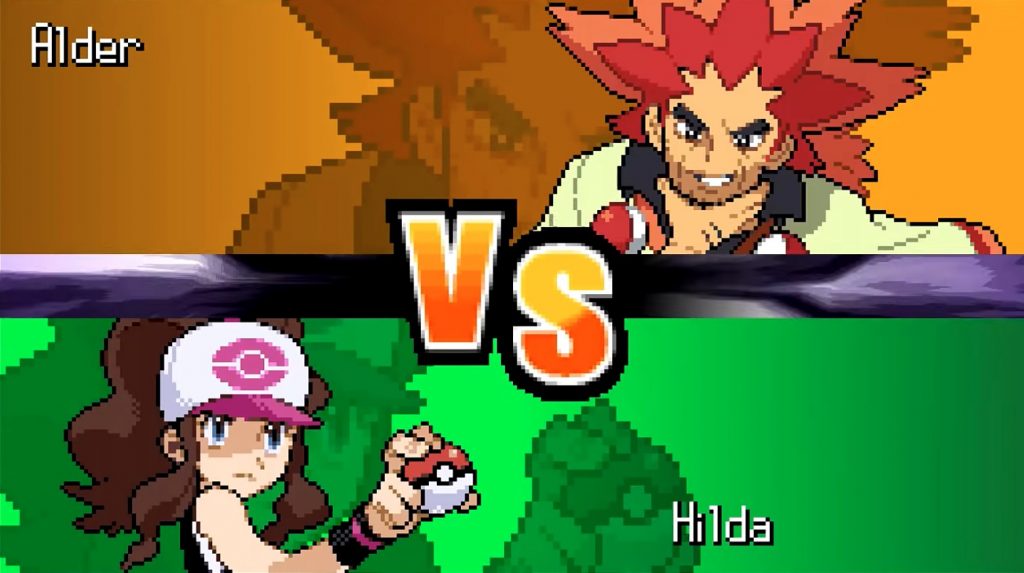
When you finally face Alder at the summit of the Pokémon League, his Pokémon’s levels are the strongest you’ll face in the entire region. But does that make him the “strongest Trainer?” Levels aren’t everything, as evidenced by how much a team of six Level 100 Caterpie would struggle against almost any opponent, especially if their only moves are Tackle and String Shot. There’s strategy to consider—and, when it comes to narrative, there’s also character.
Alder is flawed because Alder is human. Alder’s flaws give players the opportunity to enjoy a strong third act to the story where the final showdown is appropriately against the primary antagonist. Alder’s flaws also give him a nuanced character arc that ties in seamlessly with Black and White’s running themes. And, most importantly, Alder’s flaws show us that even when you’re down on your luck, grieving, and unprepared for adversity, you can still approach challenges with all your might. Even when it seems as though the entire world is against you, telling you that you will fail, there will still be those who believe in you. And even if you do fail, things will still be okay, because there are people around you who you can rely on. The people who help you do so because you have touched their lives in a meaningful way, and they touch your life in return.
No matter what life throws at you, so long as you make the most of your individual capabilities to improve the world around you, you will always be strong.
